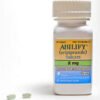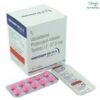What is effexor xr?
Effexor xr
Get Now
Effexor XR, the extended-release formulation of venlafaxine, is a medication primarily used to treat major depressive disorder, generalized anxiety disorder, social anxiety disorder, and panic disorder. It belongs to a class of medications known as serotonin-norepinephrine reuptake inhibitors (SNRIs), which work by balancing chemicals in the brain that affect mood and emotions.
How Effexor XR Works
Effexor XR increases the levels of serotonin and norepinephrine in the brain by inhibiting their reuptake in the synaptic cleft. By enhancing the availability of these neurotransmitters, Effexor XR can help improve mood, alleviate anxiety, and enhance overall emotional well-being.
Indications and Uses
Effexor XR is prescribed for several mental health conditions, including:
- Major Depressive Disorder (MDD): It helps relieve symptoms of depression, such as persistent sadness, lack of energy, and changes in appetite.
- Generalized Anxiety Disorder (GAD): It can reduce excessive worry, restlessness, and physical symptoms of anxiety.
- Social Anxiety Disorder (SAD): Effexor XR can help individuals feel more comfortable in social situations.
- Panic Disorder: It is effective in reducing the frequency and severity of panic attacks.
Dosage and Administration
It is typically taken once daily, with or without food. It’s essential to follow the prescribing physician’s instructions regarding dosage, as it may vary base on individual needs and the specific condition being treat. The medication usually starts at a lower dose, which may be gradually increased to minimize side effects.
Potential Side Effects
As with any medication, It can cause side effects. Common side effects include:
- Nausea
- Dizziness
- Sleep disturbances
- Dry mouth
- Increased sweating
- Fatigue
More serious side effects can occur, including:
- Elevated blood pressure
- Increased risk of serotonin syndrome (a potentially life-threatening condition)
- Withdrawal symptoms if discontinued abruptly
Patients are encourage to discuss any concerns with their healthcare provider, especially regarding side effects or the potential for withdrawal.
Interactions and Precautions
It can interact with various medications, including other antidepressants, anticoagulants, and certain over-the-counter drugs. It’s crucial for patients to inform their healthcare provider of all medications they are taking to avoid adverse interactions.
Certain medical conditions, such as liver disease or a history of bipolar disorder, may require special consideration when prescribing.
Conclusion
It is an effective treatment option for various mental health conditions, helping many individuals manage their symptoms and improve their quality of life. As with any medication, it’s important to have open communication with healthcare providers to ensure safe and effective use. If you or someone you know is struggling with depression or anxiety, consulting a healthcare professional can be the first step toward finding the right treatment.



